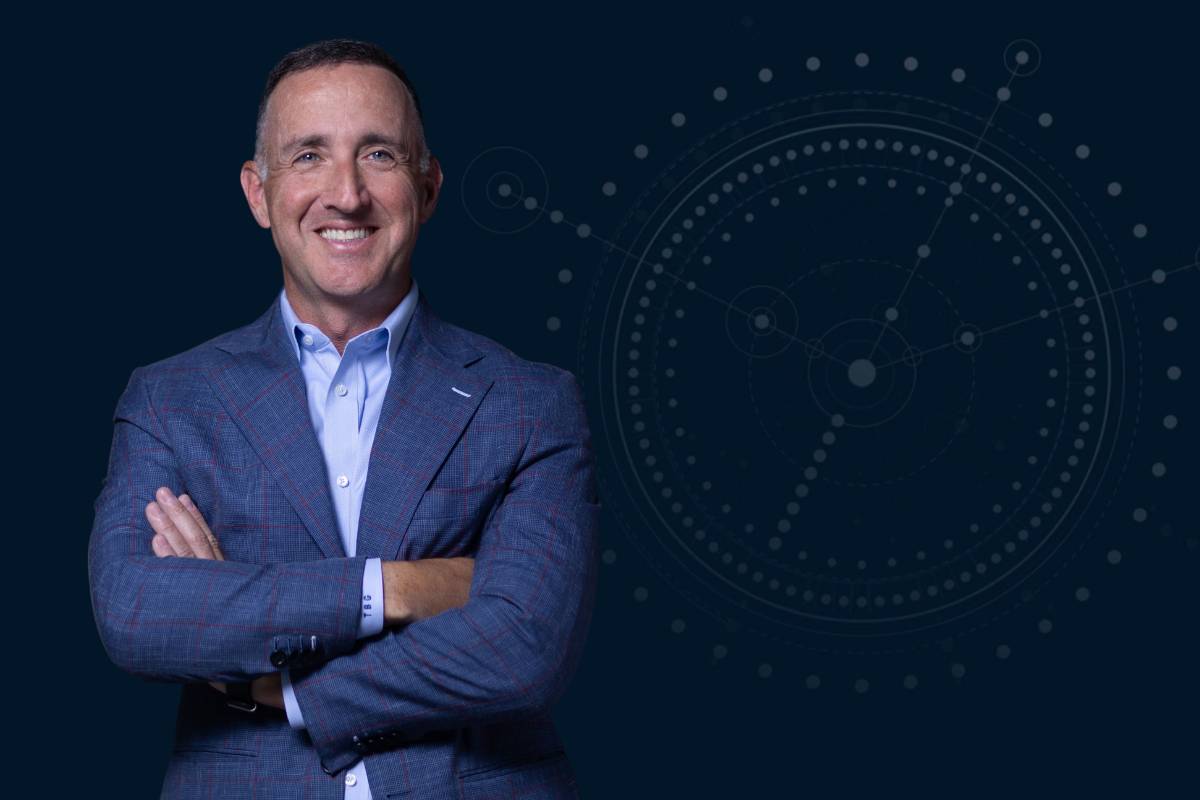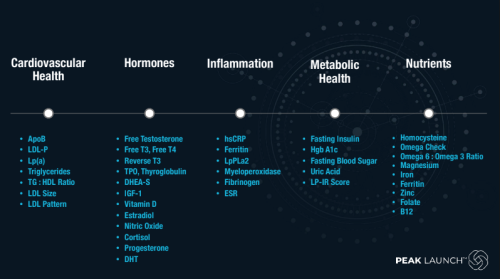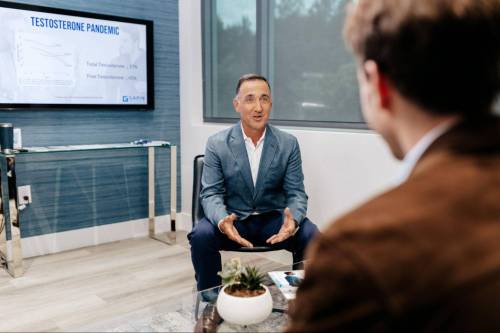

Today’s high achievers are redefining what it means to grow older. Professionals in their mid-30s and beyond are proactively investing in the mental sharpness, energy, and purpose that fuels long-term health and success, personally and professionally.
Health and performance expert Tracy Gapin, M.D., emphasizes that longevity is about more than living longer. Peak performers must invest in maintaining peak cognitive and physical function to maintain the momentum as they age.
Gapin is a board-certified urologist, men’s health expert, and founder of the Gapin Institute of Precision Medicine. He’s given TEDx talks, shared inside secrets on the current state of longevity and biohacking. In this article, he offers eight key insights into how high achievers can optimize their health, manage stress, and sustain high performance throughout every stage of their career and beyond.
1. Know Your Numbers, And What Affects Them
This is ground zero for any meaningful long-term health effort. You can’t track progress or understand outcomes if you don’t have the right data. It’s as true in personal health as it is on a business balance sheet.
The key is knowing what long-term health markers to track. In an interview on the Health Fix Podcast in December 2024, Gapin explained, “Every man out there needs to be doing the diagnostic testing to really, what I call, ‘find your blind spots,’ because there are a lot of issues that your traditional doctors don’t even know about, don’t understand.”
Key Markers to Assess and Monitor
The following graphic outlines five key pillars of data to be aware of, which can affect your performance. Ensure you know the numbers that count and then watch them over time.


Source: The Gapin Institute
Identifying the right metrics is just the beginning. What truly matters is digging deeper than surface-level benchmarks to understand what those numbers mean for your long-term health and performance.
2. Don’t Accept Basic Metrics
Once you’re tracking the right health data, the next step is learning how to interpret those numbers with precision. This is where many high achievers fall short—not because they lack discipline, but because they rely on outdated or overly general benchmarks.
That’s why Gapin cautions against accepting basic metrics at face value.
DHEA is one example of a hormone where you want to watch DHEA sulfate (the active form) for mood regulation, metabolism, and energy. TSH (thyroid-stimulating hormone) is another common hormone doctors watch, but T3 is the active form.
There are 50 hormones alone to keep an eye on, let alone heart rate, oxygen levels, and other important markers. Invest in understanding each one so that you can strategize with precision and achieve optimized results.
3. Leverage Technology for Real-Time Monitoring
To maintain peak physical and cognitive performance after 35, you need more than an occasional check-in at the doctor’s office or a bathroom scale reading. Today’s high achievers leverage real-time, continuous biometrics to get ahead of issues before they surface and fine-tune their performance in ways traditional medicine often overlooks.
From wearable rings and watches to continuous glucose monitors (CGMs), the tools are more advanced—and more accessible—than ever.
Dr. Tracy Gapin uses CGMs as an example: “You know, they’re not just for diabetics anymore. We can put a small sensor on your arm—about the size of a quarter—that tracks blood sugar 24/7 for two weeks straight. It gives us a real-time picture of how food, stress, sleep, and exercise affect your glucose levels.”
But blood sugar is just the start. Gapin emphasizes tracking a broader panel of real-time long-term health markers to understand your body’s response patterns:
- Heart Rate Variability (HRV): A key metric for recovery and stress resilience. Low HRV may signal that your body is under-recovered or inflamed.
- VO2 Max: A measure of cardiovascular efficiency and endurance, often called the “gold standard” for aerobic fitness and longevity.
- Sleep Stages (REM, Deep, Light): Sleep quality is just as important as sleep quantity. Monitoring stages can help optimize cognitive recovery, memory consolidation, and hormone balance.
- Resting Heart Rate & Oxygen Saturation: Useful baselines for identifying early signs of stress, illness, or overtraining.
- Body Composition Tracking: These insights go beyond basic tracking—they allow for targeted interventions and personalized optimization, whether your goal is to sharpen focus, reduce inflammation, improve recovery, or enhance physical stamina.
With the right tools and strategy, you can manage your biology with the same precision you bring to your business or career, turning wearable tech into a personal performance dashboard.


Source: The Gapin Institute
4. Address the Stress
Stress is everywhere. From money stress to worrying about that gray hair or how fast you can recover from an injury, stress can be consistent and intense. Gapin recommends getting ahead of the stress, knowing the long-term harm it can cause.
“We see issues with chronic systemic inflammation. Stress will drive up our stress hormone called cortisol, which will lead to systemic, chronic inflammation.” Sustained inflammation, in turn, causes damage to the gut. This can spiral into food sensitivities, which can lead to further downstream consequences.
The key to preventing these problems is to address the stress. Start with basic maintenance, prioritizing things like good sleep. Along with getting at least seven hours per night, make sure to optimize your sleep quality. A good routine can help you fall asleep — and stay that way. For Gapin, this looks like:
- Reading a paper book (no screens, not even a Kindle)
- Taking a sauna
- Meditating for five to ten minutes
- Journaling
- Having sex
Tackle a healthy diet and consistent exercise with a similar degree of thoughtfulness. Make sure to consider exercise quality as well as quantity, too. From there, work on mental health, including mindfulness and social engagement.
5. Prevent and Minimize Cognitive Decline
Many assume cognitive decline is inevitable with age, but prevention is key to long-term mental clarity and high-level thinking for driven professionals.
Gapin argues it absolutely is not. Prevention is the catalyst for maintaining a strong mind for a long time. To sustain healthy cognition over the long term, Gapin recommends that individuals focus on:
- Reducing systemic, chronic inflammation
- Optimizing hormones
- Controlling blood sugar
- Reducing stress
- Improving sleep quality
- Fixing micronutrient levels
- Addressing overall nutrition
- Cultivating gut health
- Maintaining fitness levels
He emphasizes the importance of each factor, noting, “All of these directly affect cognitive function and can help prevent cognitive decline.”
6. Don’t Fall for the Hype
Holistic solutions and science-backed answers are key to long-term health, especially at older ages when your body won’t recover as quickly from stressors and toxins. Anything that promises pristine health and longevity with a single pill is likely hogwash.
While some supplements work well as anti-aging tools, especially for men, Gapin is quick to point out that each person is different. “I’m always careful here that it needs to be individualized based on what your needs are. This is where I really like to emphasize, you need to focus on an individualized, personalized approach, and first of all, the diagnosis will help you understand what you need.”
It’s tempting to listen to an influencer’s compelling pitch and buy into the hype. But the “latest and the greatest” concept doesn’t hold up when it comes to supplementation. The same things that have perfected the human body and mind for millennia — sleep, exercise, healthy (mostly plant-based) foods — continue to be the foundations on which anti-aging and longevity are built. We may understand them better and use them more precisely, but they haven’t changed.
7. Get the Fundamentals Right Before Chasing Biohacks
Ever heard of red light therapy? How about cryotherapy? Hyperbarics? Plasmapheresis? Gapin sees the value in these experimental, avant-garde treatments, but he’s careful to say so with a caveat: Start with the fundamentals.
“They’re great treatments,” he said, “but I like to think of them as the icing on the cake. And the ingredients of your cake are nutrition, proper optimization of your gut health and hormones, sleep, minimizing the impact of stress in your body, clearing toxins, optimizing fitness, and micronutrient levels. All of these key fundamental foundational aspects of health are what really are going to be the biggest drivers.”
The fundamentals are necessary, and biohacks never take their place. This is the same principle that applies to a “miracle” supplement. Don’t believe the hype.
That doesn’t mean you have to become the world’s worst cynic. Just take each pitch with a grain of salt. Consider the science behind any claims, and engage in each activity or treatment with reasonable expectations. Above all, don’t go for the fancy stuff until you’ve mastered the foundational elements.
8. Live With Intention and Know Your Why
Living with energy, clarity, and purpose doesn’t happen by accident—it requires intention. For high achievers, the goal isn’t to slow down but to channel ambition into the next phase of personal and professional growth. Unlike the stereotypical retiree, a high achiever’s end goal for post-work life cannot be “doing nothing.” A game of golf a day, eating out, and traveling at will may sound good on the surface, but again, these are icing on the cake. You need something substantive beneath them if your retirement years are going to have value. You need purpose.
When asked what one thing he wished every 50-year-old man would do as they approached retirement, Gapin said, “I think it’s living with intention. Focus on what’s important. Focus on their why and what they need to do to get there.”
The journey is critical — and not just in broad strokes. Be deliberate and detailed in your planning for your life in retirement. “When you can focus on how all of these little things add up and can directly affect your performance, your energy, your vitality, your longevity,” he said, “then that’s what’s going to make you be more likely to stick to it and create some accountability to yourself.”
Maintaining Your A-Game Beyond 40
A sedentary lifestyle is no longer the aspiration. High-performing professionals want more than just to feel okay—they want to thrive. Whether you’re scaling your business, starting a new chapter, or simply wanting to stay mentally and physically strong, health optimization is key.
There are plenty of ways ambitious individuals can set themselves up for a successful third act. With longer life expectancies on the horizon and evolving views on retirement, it’s time to reinvent the latter stages of life. Today’s high achievers have an opportunity to design a fulfilling, vibrant life that keeps them alive and thriving for the long haul.
Image Credits: All images provided by The Gapin Institute; Thanks!











Deanna Ritchie
Editor-in-Chief at Calendar. Former Editor-in-Chief, ReadWrite, Editor-in-Chief and writer at Startup Grind. Freelance editor at Entrepreneur.com. Deanna loves to help build startups, and guide them to discover the business value of their online content and social media marketing.